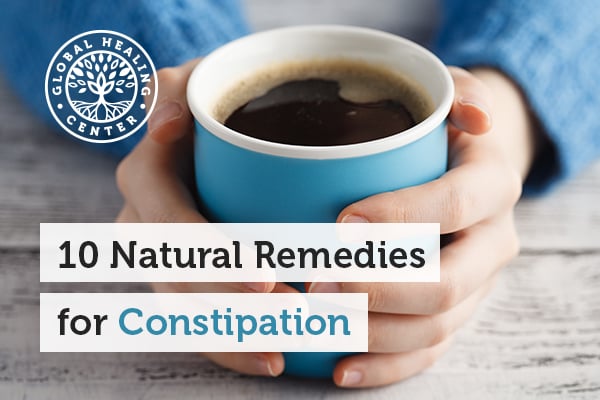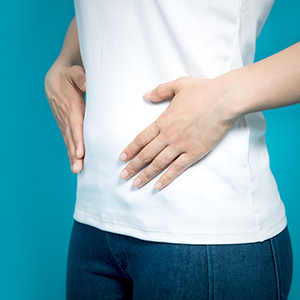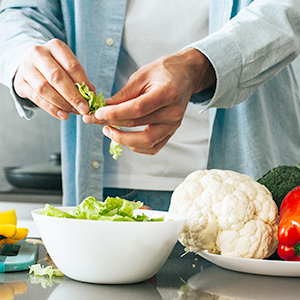
If you're like most people, you have probably experienced uncomfortable bloating and constipation and found out for yourself just how debilitating they can be. Constipation is merely a symptom with an underlying issue.
By approaching the root cause, it is possible to relieve constipation before it starts by eating the right foods. When constipation happens, you can save time and money by utilizing natural remedies, many of which you probably have around the house.
Natural Remedies for Constipation
Before you run to the pharmacy, give these 10 natural remedies for constipation a try.
1. Water
It may seem simple, but keeping hydrated facilitates digestion and supports muscle function. When the body receives enough water, the digestive system can process nutrients and move wastes along smoothly. Bowel muscles are also more efficient and are able to keep things moving. The question is: how much water is enough? If you feel thirsty, that's one indication that you should probably take a sip. If you're feeling a little backed-up, try eight to 16 ounces every two hours. Generally speaking, you should divide your body weight in half, take that number and drink the same amount of water (in ounces). If you weigh 150 pounds, then you should drink 75 ounces per day. You may need to alter this based on your activity level.
2. Prune Juice & Prunes
I bet you probably expected this one. Prunes are high in fiber and sorbitol, a carbohydrate the body digests slowly. As the fiber and sorbitol move along the intestines, they collect water which softens fecal matter. Start with an eight-ounce glass of prune juice or two or three prunes. Give them a little time to work before trying more. Too much fiber and sorbitol can cause gas, bloating, and diarrhea.
3. Coffee
This morning brew does more than wake you up. Coffee — particularly dark-roast coffee — stimulates digestion and contains fiber, oil, and water, all of which help keep the bowels moving. A cup or two will do the trick. As a diuretic, more than a couple cups may make for too many trips to the bathroom. Plus, the excessive caffeine may cause nervous symptoms. Choose organic and fair-trade varieties when choosing coffee.
4. Olive Oil
Take a tablespoon of organic extra-virgin olive oil before eating breakfast in the morning. As a nutrient-dense oil, it stimulates the digestive tract. It also lubricates the bowels and provides antioxidant protection at the same time.
5. Probiotics
Non-dairy yogurt and kefir make for an excellent breakfast, whether it's consumed as is or mixed with your favorite breakfast cereal or grain-free granola. The probiotic strains of Lactobacillus and Bifidobacterium encourage healthy bowels which translates to easier evacuation. Increased frequency, better stool consistency, and reduced digestive transit time have all been observed with individuals who consume probiotics.[1]
6. Beans
Rich in fiber, a meal containing beans shares many similar benefits as one containing prunes. The fiber keeps stool soft, and the protein has added benefits for the growth and repair of bodily tissues. Beans possess nutrients essential for muscle health and function and are low-glycemic. For many people, beans may be easier to incorporate into their daily meal plans than prunes.
7. Magnesium-Rich Foods
Magnesium is essential to muscle health and peristalsis, or the movement of food along the digestive tract. Low magnesium consumption has been associated with increased incidence of constipation.[2] Adequate magnesium intake directs water to the bowels, keeping the stool soft and easier to move. Green leafy vegetables like spinach, nuts, and avocado are high in magnesium.
8. Baking Soda & Warm Water
Mix one teaspoon of baking soda in a quarter cup of warm water. This mixture is said to relieve pain and pressure associated with constipation, and the bicarbonate is believed to reduce the symptoms associated with heartburn. The quicker you finish drinking, the better it seems to work.
9. Exercise
Movement encourages muscle health and stimulates digestion, so going for a walk after eating may help get things moving. For cases of occasional constipation, pelvic floor exercises have proven more effective than laxatives.[3] Yoga, pilates, and even running may encourage the movement of wastes along the intestinal tract.
10. Herbs
Flax seed, psyllium, and fenugreek are generally the herbs recommended to start with when it comes to countering constipation. These are easier on the stomach and fall under the category of bulk laxatives. Purgative herbs such as Senna, Cascara, and buckthorn can be effective when it comes to constipation but can be harsh, cause cramping, and are not generally recommended. [4]
Bonus: Quick Relief for Occasional Constipation
A diet rich in the foods above and an overall healthy lifestyle is the best way to prevent long-term gastrointestinal duress from being an issue, but sometimes you just need fast relief. If you need overnight relief from occasional constipation, try Oxy-Powder®, Global Healing's own all-natural colon cleanser. Safe and effective, Oxy-Powder uses monoatomic oxygen and magnesium to remove blockages.
If you're really wanting a life change to upgrade your overall wellness and digestive health, try a colon cleanse. Global Healing's Colon Cleanse Program has everything you need to clear out your gut in 6 days, resetting your health!
References (4)
- Dimidi E, Christodoulides S, Fragkos KC, Scott SM, Whelan K. "The effect of probiotics on functional constipation in adults: a systematic review and meta-analysis of randomized controlled trials." Am J Clin Nutr. 2014 Aug 6. pii: ajcn.089151.
- Murakami K1, Sasaki S, Okubo H, Takahashi Y, Hosoi Y, Itabashi M; Freshmen in Dietetic Courses Study II Group. "Association between dietary fiber, water and magnesium intake and functional constipation among young Japanese women." Eur J Clin Nutr. 2007 May;61(5):616-22.
- Ba-Bai-Ke-Re MM, Wen NR, Hu YL, Zhao L, Tuxun T, Husaiyin A, Sailai Y, Abulimiti A, Wang YH, Yang P. "Biofeedback-guided pelvic floor exercise therapy for obstructive defecation: An effective alternative." World J Gastroenterol. 2014 Jul 21;20(27):9162-9. doi: 10.3748/wjg.v20.i27.9162.
- Foster M, Hunter D, Samman S. Benzie IFF, Wachtel-Galor S. "Evaluation of the Nutritional and Metabolic Effects of Aloe vera. Herbal Medicine." Biomolecular and Clinical Aspects. 2nd edition. Boca Raton (FL): CRC Press; 2011. Chapter 3.
†Results may vary. Information and statements made are for education purposes and are not intended to replace the advice of your doctor. If you have a severe medical condition or health concern, see your physician.







